CALCIUM SUPPLEMENT/VITAMIN D - ORAL
PHONETIC PRONUNCIATION:
COMMON BRAND NAME(S): Citracal + D, Os-Cal, Oyster Shell + D
GENERIC NAME(S): calcium carbonate/ergocalciferol (vitamin D2)
Uses
USES: This combination medication is used to prevent or treat low blood calcium levels in people who do not get enough calcium from their diets. It may be used to treat conditions caused by low calcium levels such as bone loss (osteoporosis), weak bones (osteomalacia/rickets), decreased activity of the parathyroid gland (hypoparathyroidism), and a certain muscle disease (latent tetany). It may also be used in certain patients to make sure they are getting enough calcium (e.g., women who are pregnant, nursing, or postmenopausal, people taking certain medications such as phenytoin, phenobarbital, or prednisone). Calcium plays a very important role in the body. It is necessary for normal functioning of nerves, cells, muscle, and bone. If there is not enough calcium in the blood, then the body will take calcium from bones, thereby weakening bones. Vitamin D helps your body absorb calcium and phosphorus. Having the right amounts of vitamin D, calcium, and phosphorus is important for building and keeping strong bones.
How to use CALCIUM SUPPLEMENT/VITAMIN D - ORAL
HOW TO USE: Take this medication by mouth with food. If your product contains calcium citrate, then it may be taken with or without food. Follow all directions on the product package, or take as directed by your doctor. For best absorption, if your total daily dose is more than 600 milligrams, then divide your dose and space it throughout the day. If you are uncertain about any of the information, consult your doctor or pharmacist. If you are using the liquid form of this medication, carefully measure the dose using a special measuring device/spoon. Do not use a household spoon because you may not get the correct dose. If you are taking the chewable form of this medication, chew thoroughly before swallowing. If you are taking capsules, swallow each capsule whole. Do not crush or chew extended-release tablets. Doing so can release all of the drug at once, increasing the risk of side effects. Also, do not split the tablets unless they have a score line and your doctor or pharmacist tells you to do so. Swallow the whole or split tablet without crushing or chewing. Use this medication regularly to get the most benefit from it. To help you remember, take it at the same time(s) each day. If your doctor has recommended that you follow a special diet, it is very important to follow the diet to get the most benefit from this medication and to prevent serious side effects. Do not take other supplements/vitamins unless ordered by your doctor. Calcium supplements come in different forms that contain different amounts of calcium/vitamin D. Ask your doctor or pharmacist to help select the best product for you. If you think you may have a serious medical problem, seek immediate medical attention.
Side Effects
Precautions
Interactions
Overdose
Images
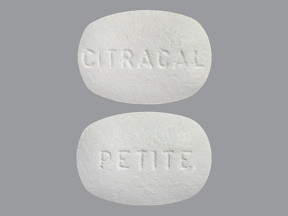
- color
- white
- shape
- oblong
- imprint
- CITRACAL, PETITE
Reviews
Faq for CALCIUM SUPPLEMENT/VITAMIN D - ORAL
Calcium supplement/vitamin D is used to prevent or treat low blood calcium levels and osteoporosis (weak bones).
Follow the dosage instructions provided by your doctor or on the product label. Take the medication with a full glass of water and do not lie down for at least 30 minutes after taking it.
Common side effects may include constipation, nausea, stomach upset, and increased thirst. If you experience more serious side effects such as irregular heartbeat or allergic reactions, seek medical help immediately.
Calcium supplements can interact with certain medications, such as antibiotics or thyroid medications, so it is important to inform your doctor about all the drugs you are taking to avoid any potential interactions.
The duration of treatment will depend on your specific condition and your doctor's recommendation. It is important to follow their instructions and continue taking the medication until advised otherwise.
While it is possible to get calcium and vitamin D through a balanced diet, some individuals may require supplements to ensure they meet their daily requirements.
It is recommended to maintain a balanced diet with adequate calcium and vitamin D sources while taking the medication. Avoid excessive intake of caffeine, alcohol, and tobacco, as they can hinder the absorption of calcium.
There is a potential risk of kidney stones when taking high doses of calcium. However, this risk can be minimized by drinking plenty of fluids and following your healthcare provider's recommendations for dosage.
Take the missed dose as soon as you remember. If it is close to your next scheduled dose, skip the missed dose and continue with your regular dosing schedule. Do not double the dose to make up for a missed one.
Disclaimer
IMPORTANT: HOW TO USE THIS INFORMATION: This is a summary and does NOT have all possible information about this product. This information does not assure that this product is safe, effective, or appropriate for you. This information is not individual medical advice and does not substitute for the advice of your health care professional. Always ask your health care professional for complete information about this product and your specific health needs.
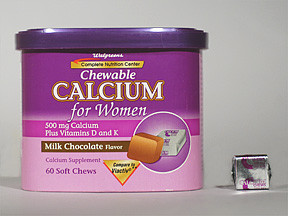
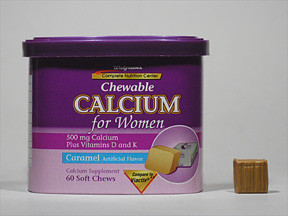
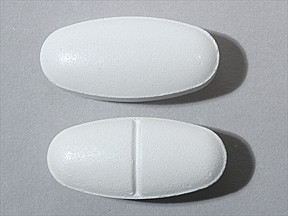


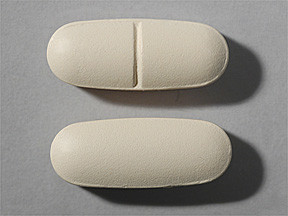
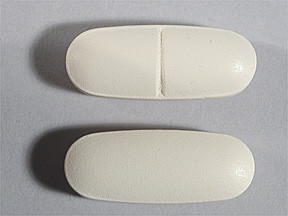

No Reviews Yet